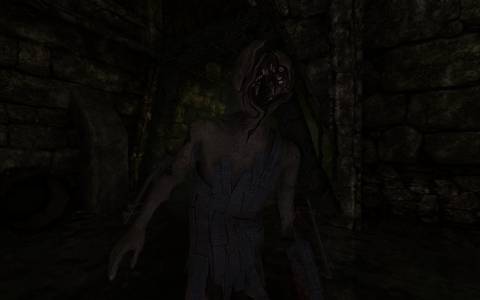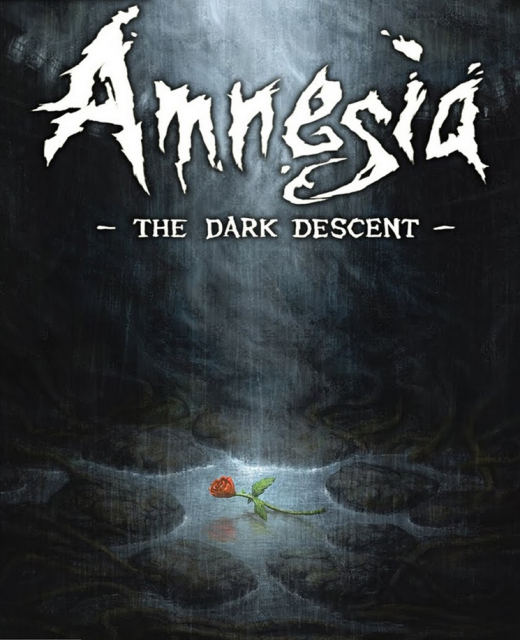A Lovecraftian scarefest
Despite their graphical restrictions and penchant for awful voice acting, the survival horror games of the ’90s and early 2000s always managed to frighten with effective use of the protagonist’s vulnerability and a fantastic, panic-inducing atmosphere. In recent years, however, this traditional survival horror genre has almost died out, with beefy mercenaries armed to the teeth with myriad heavy weapons, easily disposing of any ‘scary’ foe they may encounter, replacing the hapless, civilian hero. They may be good, or even sublime games in their own right, but those searching for a truly terrifying experience have been left in the cold. Swedish developer Frictional Games went some way to fulfilling these urges with their Penumbra trilogy, but their latest offering, Amnesia: The Dark Descent, is unequivocally haunting, harkening back to the survival horror games of old and taking them firmly over the edge.

The game starts ominously enough as you awaken inside a vast castle with no recollection of how you came to be. The only thing you know is that your name is Daniel and a note left from yourself reveals that you wiped your memory to forget the events of the past. Your only course of action is to follow the note’s guidelines, heading to the inner sanctum of the castle to kill a man named Alexander for reasons yet unknown. Throughout the course of the game you’ll find notes and experience flashbacks that will begin to piece everything together. It may be derivative of other games – almost like collecting audio logs - but it’s certainly effective, urging exploration as you try to figure out the mysteries of the castle and Daniel himself. It takes obvious inspiration from the brilliant author H.P. Lovecraft, and the writing is superb throughout, weaving a rapidly engaging narrative one page at a time as you navigate deeper and deeper into the depths of the castle. With virtually no character interaction throughout the length of the game, it’s left to hold the story together and it does so admirably.
Admittedly, however, there’s little characterisation to Daniel. But this allows the player to embody his persona and immerse themselves in this world. Similarly to the survival horror protagonists of old, Daniel is fragile and very vulnerable to the dangers that stalk the castle, not least his own sanity. Spend too much time in the dark and he begins to lose it. The screen blurs and shifts from side to side, dizzyingly so, as you lose control for seconds at a time. The nervous, psychotic grinding of his teeth is unbearable, and as he descends deeper into madness he’ll begin to hallucinate as his mind bends to the will of the darkness. Luckily, the castle has a fair few tinderboxes lying around and a handy lantern, allowing you to light the way providing you have enough oil to light it. Being in the light will keep Daniel calm so you’ll soon begin to choose when and where you want to deploy your ever dwindling supply of light. Because while it provides a safe haven for Daniel’s mind, it’s also a beacon for the evil spirits that inhabit the dark, claustrophobic corridors of the castle.

Even before these grotesque abominations are introduced Amnesia isn’t exactly a soothing experience. The constant, foreboding sense of dread it conjures up is often insufferable. It bears down on your own sanity like a terrifying, portentous force, placing you nervously on the edge of your seat - at the very end of your tether - as you edge deeper into the unknown. It successfully pulls at your most primal fears with unrelenting tenacity; yet, it’s superbly subtle at the same time, maniacally messing with your psychosis as you eventually become afraid of things that aren’t even there. The ghastly monsters that inhabit the castle aren’t a constant presence, heightening the scares as they become a rare adversary rather than a constant obstacle you must avoid – successfully edging away from ever becoming a tedious game of cat and mouse. You never know when they’ll strike so you’re constantly on the lookout, reacting to any bustle of wind or distant footstep with a nervous shriek.
And there’s no possible way to fight back; your only option is to run and hide, hoping you can lose them in the darkness or find the safety of an empty closet. It’s here that managing your light becomes a unique balancing act as you weigh up sanity or safety. Even looking directly at the monsters combats Daniel’s whim, so you’ll find yourself curled up in the corner of a room, unable to look up, just hoping this monstrosity gives up and leaves. It’s absolutely nerve-wracking.
The gothic nature of some of the castle’s aesthetics compound the fear, with demonic statues and menacing walls looming inwards, as though hostile. Though it’s the familiarity of the study, with its shelves of historic literature and precious oak tables, or the wine cellar and it’s tales of drunken banter, that frighten the most. You become immersed in the castles believability, even as it begins to unravel around you as Daniel’s mental states worsens and the unflinching evil spirits overwhelm. The atmosphere is phenomenal throughout; from the visual effects to the sound design, everything is programmed to send a ghastly shiver down your spine. The monsters might be what you’re afraid of, but when they’re not around the tension is constantly building. You never feel safe. Candles will suddenly blow out while you hear the distant sound of some disembodied soul screaming for help, or the bloodcurdling thump of a footstep behind you. Normally it’s nothing at all, but you’ll never be so petrified.

When you’re not shaking to the bone and hiding from monsters, Amnesia is a fairly simple physics-based puzzler. To progress through the castle you’ll normally have to collect a few items, combine them together and use them to uncover some secret passage or open the next door. It’s never very difficult but there’s still an enjoyable sense of satisfaction that comes from completing each puzzle, mainly because of the progress made. The physics at work are also very impressive. Built upon Frictional’s own HLP engine it has a deliberately realistic feel as you use the mouse to pull open doors, cupboards and so on before pushing them closed. It can feel unwieldy at first, but you soon grow to appreciate it because of the immersive qualities it possesses.
At around eight hours, Amnesia: The Dark Descent isn’t a particularly lengthy game, and there’s no real reason to go back. But despite its lack of replayability, that first playthrough is guaranteed to stick with you long after you’ve stepped away from the keyboard. This is a survival horror game that doesn’t rely on cheap jump scares or over-exuberant gore to scare the player. It’s refreshingly methodical in its frights, building a malevolent presence with fantastic atmosphere that’s more chilling than any other game before it. At times it’s a struggle to play purely because of how scary it can be, and it’s not often you can say that about a video game. Just remember: lights off, headphones on, and try not to go insane.

0 Comments